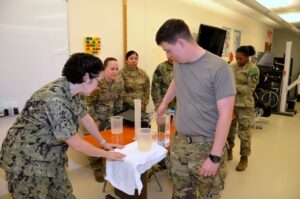
Story by Lt.Cmdr. Cynthia DeArmon and Lt.Cmdr. Patrick Mitchell
Medical Education Training Campus
As faculty and subject matter experts assigned to the Medical Education and Training Campus (METC), Occupational Therapy (OT) and Physical Therapy (PT) officers play a crucial role in preparing military healthcare paraprofessionals to support service members, veterans, and their families. Both fields are essential in rehabilitative care, helping individuals regain strength, mobility, function and independence after injury or illness. As Medical Service Corps Officers, we understand that the strength of our military force lies not only in its weapon systems and technology, but also in the health and resilience of its personnel. Through rigorous, accelerated training programs like the Physical Therapy Technician (PTT) and Occupational Therapy Assistant (OTA) courses, METC plays a vital role in delivering medical power, ensuring that future OTAs and PTTs are equipped with the knowledge, skills, and abilities needed to provide high-quality care across all military platforms and settings.
Building a Resilient Force
The OTA and PTT courses at METC are designed to produce skilled paraprofessionals who support the military healthcare mission by aiding in the recovery and maintenance of physical and mental functions. Both courses are consolidated – with OTA training Navy and Army students, while PTT trains Navy, Army and Air Force.
In the OTA program, Navy trainees complete 33-weeks of coursework, while Army trainees complete 34 weeks of intense training that includes a field training exercise. Graduates of the course, which is nationally accredited, are awarded an associate degree in a third of the time it would take them at a commensurate civilian program. During their training, OTAs learn core skills such as: therapeutic use of self, orthotic fabrication, and activity analysis and modification. Upon degree completion, OTA graduates are qualified to sit for the National Board for Certification in Occupational Therapy exam and become Certified Occupational Therapy Assistants – a civilian designation that opens employment opportunities after the military. When military OTAs enter the field they work with occupational therapists, helping Soldiers, Sailors, and Marines regain daily life skills after injury, illness, or trauma. Whether it’s retraining service members to perform essential tasks following a training-related injury or supporting chronic rehabilitation needs of our wounded warriors, OTAs ensure that personnel can return to duty or transition effectively to civilian life.
Similarly, PTTs work under the supervision of physical therapists to restore mobility, strength, and endurance. PTT students complete a 16-week consolidated didactic course (Army and Navy students complete additional coursework following the conclusion of the consolidated course) that emphasizes evidence-based practices for treating a variety of musculoskeletal conditions. The didactic phase is followed by several weeks of hands-on clinical training conducted typically at military medical treatment facilities. Future PTTs learn core therapeutic techniques, including therapeutic exercise, neuromuscular reeducation, soft tissue/joint mobilizations, and functional training.
Additionally, PTTs play a preventive role by teaching service members proper movement mechanics, strength training, and injury prevention strategies in clinic and at operational units. From executing care plans to reassessing muscle strength and joint range of motion, PTTs are instrumental in rehabilitating Soldiers, Sailors, Airmen, and Marines with musculoskeletal injuries which are commonly seen in the physically demanding field environments. By addressing these injuries swiftly and effectively, PTTs help minimize downtime and maintain operational tempo for our fighting forces.
Training the Next Generation of Rehabilitation Experts
METC provides a structured and immersive learning environment that bridges the gap between academic instruction and real-world application. Students in the OTA and PTT courses gain hands-on experience through clinical simulations, case studies, and direct patient interactions. This practical approach ensures that graduates are prepared to provide immediate, high-quality care in diverse settings, including military hospitals, rehabilitation centers, and deployed environments.
Both courses benefit from METC’s joint-service environment where Army, Navy, Air Force, and Coast Guard students train together. This fosters interoperability and prepares military personnel to collaborate seamlessly with other branches, a critical advantage in joint operations. Moreover, the OTA training aligns with civilian credentialing standards, offering graduates valuable certifications that enhance their post-service career prospects while meeting immediate force needs. While not able to award a degree at course completion, PTT students do earn 27 college credits toward a Physical Therapist Assistant associate degree. The PTT students have the opportunity to complete the remainder of the PTA degree at an accredited community college through a Skills Bridge Agreement with METC.
By training skilled OTA and PTT paraprofessionals, METC supports the broader mission of military medicine—ensuring that service members receive the best possible rehabilitative care. Their work not only aids in recovery but also enhances the overall readiness and resilience of the armed forces. As healthcare continues to evolve, the contributions of occupational and physical therapists at METC remain mission-critical to the well-being of military personnel and their families.
Empowering the Force, Strengthening the Future
The OTAs and PTTs graduating from METC are force multipliers—extending the reach of Military Medicine to keep our military force fit for duty and resilient under pressure. Their work directly supports the military’s ability to deter aggression, win conflicts, and maintain our nation’s security by ensuring that every service member can perform at their peak.
In an era of evolving threats and increasing operational demands, the medical power delivered by METC’s OTA and PTT courses is indispensable. Graduates of these courses are not only dedicated to healing the military force, but also embody the Department of Defense’s commitment to its people, reinforcing promise that every service member receives the care needed to succeed—both in uniform and beyond. By championing these training initiatives, the OTA and PTT Service Leads contribute to a stronger, healthier, and more capable military force, ready to meet any challenge on the horizon.